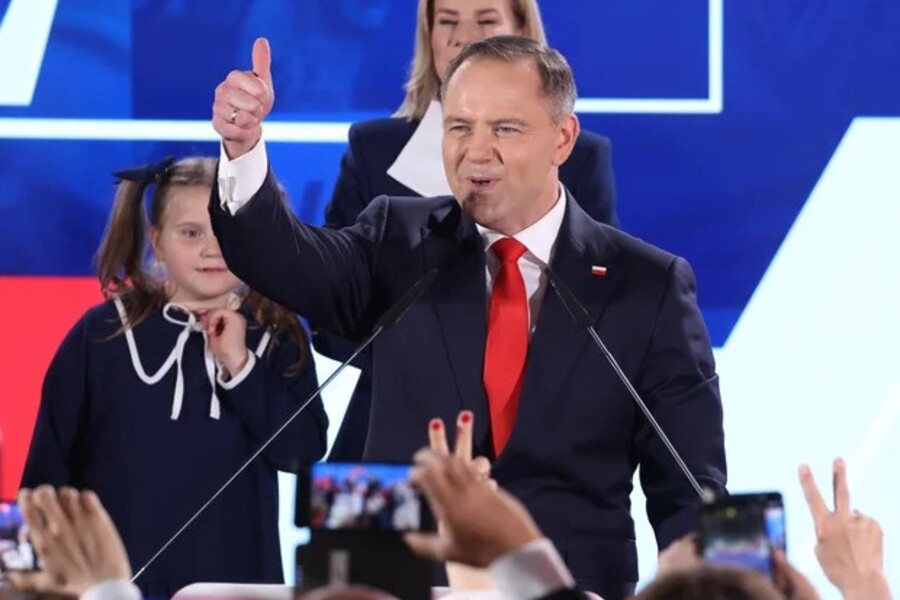Conservative candidate Karol Nawrocki has emerged as the winner in Poland’s presidential runoff election, a closely watched contest that underscored the country’s deep political divisions and signaled a potential shift toward a more populist, nationalist trajectory under his leadership.
According to the official tally released Monday, Nawrocki secured 50.89% of the vote, narrowly defeating liberal Warsaw Mayor Rafał Trzaskowski, who garnered 49.11%. The razor-thin margin capped a tense election season that highlighted the polarized political landscape in Poland, a key NATO and European Union member on the alliance’s eastern flank.
The tight race had the nation on edge following a first round of voting two weeks ago. Early exit polls on Sunday initially indicated a possible victory for Trzaskowski, but as counting continued, the tide turned in Nawrocki’s favor. His victory is expected to entrench a more populist approach in Poland’s politics, a development that aligns with the support he received from former U.S. President Donald Trump and other prominent right-wing figures.
A President with Real Power
Though the prime minister, currently Donald Tusk, holds significant day-to-day executive power in Poland, the presidency is far from symbolic. The president wields key powers, including influencing foreign policy and vetoing legislation—a role that has frequently frustrated Tusk’s efforts to implement campaign promises, such as liberalizing abortion laws and introducing civil partnerships for same-sex couples.
Tusk’s government, in power since late 2023 through a broad coalition, has faced challenges in advancing its agenda, not least due to outgoing President Andrzej Duda’s repeated vetoes. With Nawrocki succeeding Duda on August 6, Tusk’s ability to fulfill his promises, including reversing controversial judicial reforms criticized by the EU as undermining democratic norms, appears increasingly uncertain.
Nawrocki’s Background and Support Base
At 42, Nawrocki brings both a fresh face and deep conservative credentials to the presidency. A historian and amateur boxer, he previously headed the Institute of National Remembrance, where he championed nationalist historical narratives and orchestrated the removal of Soviet Red Army monuments. His leadership earned him a spot on Russia’s wanted list, according to Polish media.
Nawrocki’s supporters see him as a staunch defender of traditional values, with strong backing from voters opposed to secular trends like LGBTQ+ rights. Despite allegations of past ties to criminal figures and involvement in a street brawl, which he defended as “noble” fighting, he retained support among conservative voters, many of whom saw these claims as politically motivated smears.
His populist appeal was amplified by overt endorsements from Trump, who hosted him at the White House last month. The conservative group CPAC also held its first event in Poland to rally support for Nawrocki, featuring high-profile figures like U.S. Homeland Security Secretary Kristi Noem. This backing, combined with symbolic displays of U.S. flags at his rallies, cemented Nawrocki’s image as a pro-Trump candidate who could fortify Poland’s transatlantic ties.
Implications for Ukraine and NATO
Nawrocki has vowed to continue supporting Ukraine in its struggle against Russian aggression but has also criticized President Volodymyr Zelenskyy, accusing him of exploiting Poland’s generosity toward refugees. He has promised to prioritize Poles for social services, a stance that resonates with nationalist voters but could strain relations with Kyiv.
Despite these tensions, Zelenskyy expressed optimism on Monday, saying he looked forward to “continued fruitful cooperation with Poland and with President Nawrocki personally.” NATO Secretary-General Mark Rutte also congratulated Nawrocki and reaffirmed the alliance’s commitment to strengthening defenses in the face of Russia’s threats.
A Divided Political Landscape
Nawrocki’s victory raises questions about the stability of Poland’s coalition government and Tusk’s ability to govern effectively until the next parliamentary elections in 2027. Analysts suggest that the unfulfilled promises, compounded by a president with veto power, could create friction within Tusk’s broad coalition, possibly setting the stage for the conservative Law and Justice party to rebuild alliances and regain influence.
Hungarian Prime Minister Viktor Orbán, a close ally of Nawrocki and a prominent nationalist leader in the EU, was quick to laud the victory, highlighting the growing network of conservative leaders challenging liberal policies across Europe. Meanwhile, EU Commission President Ursula von der Leyen extended congratulations but emphasized the importance of continued cooperation.
Looking Ahead
Nawrocki’s presidency, set to begin on August 6, will likely shape Poland’s domestic and foreign policies at a pivotal time. His win signals a potential return to the populist, nationalist policies that characterized the Law and Justice government from 2015 to 2023. With tensions simmering between Poland and its EU partners over democratic norms and judicial reforms, Nawrocki’s presidency could deepen the rift or open new avenues for negotiation.
For now, Poland—and Europe—await to see whether Nawrocki will consolidate his victory into a transformative presidency or find himself constrained by Poland’s complex political dynamics and international obligations.
User-Intent Q&A
What happened?
Karol Nawrocki narrowly defeated Rafał Trzaskowski in Poland’s presidential runoff election, signaling a potential shift toward a more nationalist, populist government.
Why does it matter?
The presidency holds veto power and can significantly shape Poland’s domestic policies and foreign relations, including with the EU and Ukraine. Nawrocki’s win could hinder Prime Minister Tusk’s reform agenda.
What’s next?
Nawrocki will be sworn in on August 6, after which he’s expected to influence Poland’s relationship with its EU partners, its stance on judicial reforms, and its support for Ukraine, all while navigating tensions with a broad ruling coalition.
If you’d like, I can refine or expand on any section! Let me know.

